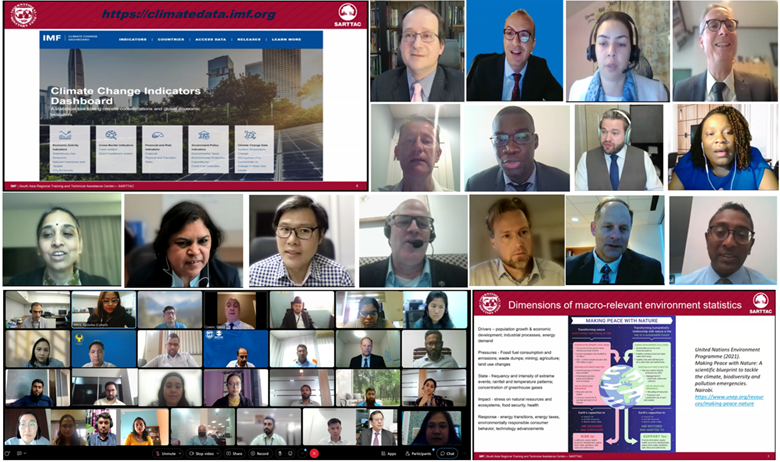South Asia Regional Webinar on SEEA for Climate Change

The South Asia Regional Training and Technical Assistance Center (SARTTAC) and the IMF Statistics Department conducted a virtual workshop titled Introduction to Climate Change Indicators for Economic Analysis and Policy Formulation (October 31-November 3, 2022) for officials from the SARTTAC member countries - Bangladesh, India, Sri Lanka, Mongolia, Bhutan, Cambodia, Maldives, Vietnam, Nepal, Philippines, along with those from Cambodia, Lao P.D.R., Philippines, and Vietnam.
The workshop outlined several environment and climate change indicators that are used by the IMF for surveillance, including those presented in the IMF's Climate Change Indicator Dashboard. The workshop had 60 participants and more than a dozen experts presenting the different facets of macro-relevant environment indicators. Also included was a high-level panel with speakers from the UN Food and Agriculture Organization, UN Statistics Division, and UN Economic and Social Commission for Asia and the Pacific, moderated by Mr. James Tebrake, Deputy Director, IMF.
Climate change is a significant threat to long-term growth and prosperity and affects the economic well-being of all countries directly. Therefore, policymakers need to compile a range of environmental and climate-related statistics to support the development of fiscal and macroeconomic policies to address the economic implications of climate change. During the workshop, the participants were given an overview of indicators that can fulfill this role and the statistical frameworks needed to produce them. Emphasis was laid on the adoption of the System of Environmental-Economic Accounting. Illustrations were provided, for example, on how SEEA-based Air Emission Accounts can be used, in conjunction with national accounts and international trade statistics, to evolve consumption-based emission estimates. A view of the consumption-related emissions can help gauge the emission trail of different goods and services consumed in an economy and assess carbon reduction options suited for climate goals. Linkages between these indicators and the critical climate change concerns of participating countries were also identified.
To enable the countries to formulate a way forward, insights were provided into the new Data Gaps Initiative, which required adapting the national statistical classification systems and setting up production systems for the regular release of such macro-relevant environment indicators. Participants were also informed of the various data and training resources available for helping them in their endeavors.
